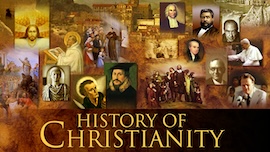The Church Soon Rejected The Biased "Council Of Robbers"
THE RELATIONSHIP of Christ’s divinity to his humanity perplexed many in the early church. Theologians sometimes overemphasized the Lord’s humanity and sometimes his divinity. In fact, it took six ecumenical councils (councils of the whole church) four centuries to define what the Scripture teaches and the church believes about Christ. The first was held in Nicea (325), and the last at Constantinople (681).
Sandwiched between the third council (Ephesus, in 431) and fourth council (Chalcedon, 451) was another council at Ephesus which did not make the list. It met on this day, 8 August 449, to consider the case of Archimandrite (Abbot) Eutyches.
In distancing himself from one heresy, Nestorianism, Eutyches was accused of falling into an opposite error. Where Nestorius had divorced Christ’s human and divine natures, Eutyches swallowed the human into the divine. Patriarch Flavian and some other bishops had condemned him at Constantinople in a rigged trial.
But the Egyptian church that Eutyches belonged to pushed back with some force, because Eutyches’ position was derived from the theology of Alexandria. Patriarch Dioscorus of Alexandria presided at Ephesus. He had two reasons to oppose Flavian: he was the successor of Cyril, who had led the fight to condemn Nestorius, and he personally disliked Flavian because he was Nestorius’ friend.
Dioscorus convened the assembly before western bishops could arrive, refused to allow Eutyches's accusers to be heard, suppressed a letter from the pope, prevented note-taking, and even introduced the threat of military violence. The council cleared Eutyches and deposed Flavian. Emperor Theodosius II endorsed the proceedings.
But Hilary, a legate from Pope Leo I in Rome, rejected the sentence with the single word, “Contradicitur” (“It is opposed”). When word reached Leo himself, he promptly excommunicated all who had participated and gave the Ephesus council the nickname which has stuck to it: “Council of Robbers.” Two years later, with Theodosius dead, Empress Pulcheria convened another council, the Council of Chalcedon. It repudiated the Robber Council.
The results came too late for Flavian. Deported, he had died within a few days of entering into exile.
—Dan Graves
----- ----- -----
History of Christianity discusses the early church councils. Watch at RedeemTV.
History of Christianity can be purchased at Vision Video







